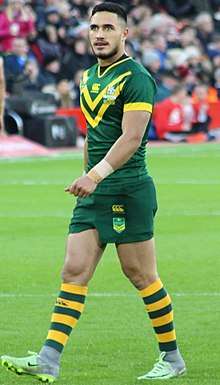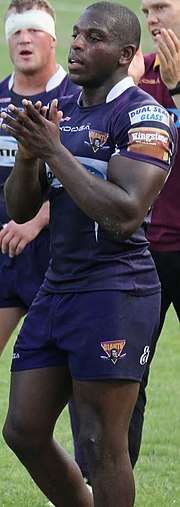2017 Rugby League World Cup Final
The 2017 Rugby League World Cup Final was a rugby league match to determine the winner of the 2017 Rugby League World Cup, played between reigning champions Australia and their rivals England on 2 December 2017 at Brisbane Stadium in Brisbane, immediately after the final of the concurrent women's competition.[1] It was the first time in 22 years since England had played in a World Cup final, when they lost to Australia 8–16 in the 1995 Rugby League World Cup Final at Wembley Stadium.
| 2017 Rugby League World Cup Final | |||||||||||||
|---|---|---|---|---|---|---|---|---|---|---|---|---|---|
 Brisbane Stadium hosted the match | |||||||||||||
| |||||||||||||
| |||||||||||||
| Date | 2 December 2017 | ||||||||||||
| Stadium | Brisbane Stadium | ||||||||||||
| Location | Brisbane, Australia | ||||||||||||
| Man of the Match | Boyd Cordner (Australia) | ||||||||||||
| Australian National Anthem | Scott Muller | ||||||||||||
| English National Anthem | Amber Dawn-Finch | ||||||||||||
| Referees | Gerard Sutton (Australia) | ||||||||||||
| Attendance | 40,033 | ||||||||||||
| Broadcast partners | |||||||||||||
| Broadcasters |
| ||||||||||||
| Commentators |
| ||||||||||||
Australia became the winners of the Rugby League World Cup for a record eleventh time, beating England 6–0 to retain the Paul Barrière Trophy and become the first team since 1977 to win the World Cup on home soil.[2] This match saw a new equal record low for tries in a Rugby League World Cup Final with only one try scored, equaling the one try scored in the 1992 final. It also saw the lowest combined score for a final of 6, which was also previously held by the 1992 final where only 16 points was scored.
Brisbane previously hosted the final of the 2008 tournament, in which New Zealand defeated hosts Australia 34–20.
Route to the final
| Australia | Round | England | ||||||||||||||||||||||||||||||||||||||||||||||||||||||||||||||||||||||||||||||||||||||||||||
|---|---|---|---|---|---|---|---|---|---|---|---|---|---|---|---|---|---|---|---|---|---|---|---|---|---|---|---|---|---|---|---|---|---|---|---|---|---|---|---|---|---|---|---|---|---|---|---|---|---|---|---|---|---|---|---|---|---|---|---|---|---|---|---|---|---|---|---|---|---|---|---|---|---|---|---|---|---|---|---|---|---|---|---|---|---|---|---|---|---|---|---|---|---|---|
| Opponent | Result | Group stage | Opponent | Result | ||||||||||||||||||||||||||||||||||||||||||||||||||||||||||||||||||||||||||||||||||||||||||
| 18–4 | Match 1 | 4–18 | ||||||||||||||||||||||||||||||||||||||||||||||||||||||||||||||||||||||||||||||||||||||||||||
| 52–6 | Match 2 | 29–10 | ||||||||||||||||||||||||||||||||||||||||||||||||||||||||||||||||||||||||||||||||||||||||||||
| 34–0 | Match 3 | 36–6 | ||||||||||||||||||||||||||||||||||||||||||||||||||||||||||||||||||||||||||||||||||||||||||||
Source: |
Final standing |
Source: | ||||||||||||||||||||||||||||||||||||||||||||||||||||||||||||||||||||||||||||||||||||||||||||
| Opponent | Result | Knockout stage | Opponent | Result | ||||||||||||||||||||||||||||||||||||||||||||||||||||||||||||||||||||||||||||||||||||||||||
| 46–0 | Quarter-finals | 36–6 | ||||||||||||||||||||||||||||||||||||||||||||||||||||||||||||||||||||||||||||||||||||||||||||
| 54–6 | Semi-finals | 20–18 | ||||||||||||||||||||||||||||||||||||||||||||||||||||||||||||||||||||||||||||||||||||||||||||
Australia

Australia's road to the final began on October 27 at Melbourne Rectangular Stadium in Melbourne, where they played England. After conceding the first try Australia didn't concede for the rest of the match and went on the win 18–4.[3] Australia's next game was in Canberra against France. Australia jumped out to an early 12–0 lead through a Wade Graham double before French fullback Mark Kheirallah fielded an Australian kick and ran 80 meters to score under the posts and make it 12–6. Wade Graham went on to score 4 tries as Australia ran out 52–6 winners.[4] The Kangaroos' final group match was in Sydney against Lebanon. Australia put on a very controlled and professional performance to win comfortably, 34–0.[5]
Australia would face the win-less Samoa in the first test match in Darwin to open the quarter-finals. Australian winger Valentine Holmes became the first ever player to score 5 tries in a World Cup match as Australia won 46–0.[6] Australia then moved on to Brisbane to play an undefeated Fiji in the first semi-final. Australian winger Valentine Holmes this time scored 6 tries and broke his own record for the most tries in a World Cup match, and also took his tournament tally to 12 thus becoming the highest tally in a single World Cup. Australia went on to beat Fiji 54–6 and qualified for their 12th World Cup final.[7]
England

England began their World Cup campaign against Australia on October 27 at Melbourne Rectangular Stadium in Melbourne. England opened the scoring with winger Jermaine McGillvary crossing in the 5th minute, taking an early 4–0 lead. England then conceded two tries to trail 4–10 at half time. The second half was very evenly matched with both teams having chances to score, until a Cameron Smith penalty goal in the 76th minute extended Australia's lead over a converted try, and conceding a 79th minute intercept try to Josh Dugan sealed an England's first defeat of the tournament, going down 4–18.[3] England's second match of the tournament came against Lebanon in Sydney. A first half blitz saw England take a 22–6 half time lead, with tries to Kallum Watkins, Jermaine McGillvary, Ryan Hall and Ben Currie. A more conservative second half saw England only score and conceded one try, and seal a 29–10 victory with a last minute field goal by Gareth Widdop.[8] Much controversy surrounded an incident in the second half where Lebanon captain Robbie Farah accused England's Jermaine McGillvary of biting during a tackle. McGillvary was not suspended due to no evidence that he bit Farah.[9] England's final group match came against France in Perth. England got off to a fast start, scoring 3 tries in the first nine minutes, taking a 26–6 half time lead. Much alike their previous group match against Lebanon, England took their foot off the pedal in the second half, only scoring two more tries, going out victorious 36–6 and booking their place in the knockout stage.[10]
England faced the winners of Group C, Papua New Guinea in their quarter final clash in Melbourne. Much a-like their group stage matches, England were the first team to score, taking a 14–0 lead into half time. A Ben Currie try in the 56th minute almost certainly booked England a semi final berth until Garry Lo got PNG's first try and set up an exciting last 20 minutes, until 3 tries in the last 12 minutes saw England run out 36–6 victors.[11] England then face a passionate Tongan team in the semi-finals in Auckland. England opened the scoring through a try to winger Jermaine McGillvary, scoring his seventh of the tournament. Five minutes later Gareth Widdop took the lead out to 12–0, a lead which England took into half time. A 50th-minute penalty goal took England out past a 2 converted try lead and a 68th minute try to John Bateman all but looked to seal England's first World Cup final berth since 1995, but three tries in 4 minutes to Tonga closed England's lead to two points with 3 minutes left. The ending of the match was very controversial, with Tonga's Andrew Fafita crossing the line in the dying seconds for referee Matt Cecchin to rule a knock-on against the Tongans. Replays showed that the knock-on may have been a result due to a strip from England, but Cecchin failed to review the possible try and thus awarding England a 20–18 semi final win, and advancing to the final to face Australia, who they faced in their opening group match.[12]
Match
Summary
Pre-game
The 2017 Women's Rugby League World Cup Final between Australia and New Zealand was a curtain-raiser to the men's final. Australia won 23–16, retaining their 2013 title and their second overall.[13]
Injured Australian five-eighth Johnathan Thurston and English rugby league icon Kevin Sinfield presented the teams onto the field. Amber Dawn-Finch sang God Save the Queen for the English, and tenor Scott Muller sang Advance Australia Fair for the Australians.
First half
Cordner scored first, and Smith converted.
Second half
- 47': Michael Morgan goes over. Ruled no try, ruled interference. Penalty to England.
Post-game
Boyd Cordner was named man of the match, and Billy Slater was named player of the tournament.
Details
| Australia |
6 – 0 | |
|---|---|---|
| Tries: Cordner (15') 1 Goals: Smith 1/1 (16') |
1st: 6 – 0 2nd: 0 – 0 Report |
Brisbane Stadium, Brisbane Attendance: 40,033 Referee: Gerard Sutton (Australia) Man of the Match: Boyd Cordner (Australia) |
|
| ||||||||||||||||||||||||||||||||||||||||||||||||||||||||||||||||||||||||||||||||||||||||||||||||||||||||||||||||||||||||||||||
1 - Sean O'Loughlin was originally selected to play but withdrew due to a quad injury. He was replaced by Sam Burgess whilst Ben Currie filled Burgess's spot in the second row, and Jonny Lomax filled Currie's spot on the bench.[14]
|
Touch judges:
|
Notes:
- Australia became the first team to win the Rugby League World Cup title eleven times.
- This was the first time a team won the World Cup on home soil since 1977.
- The aggregate 6 points scored was the least in a Rugby League World Cup final.
- This match saw a new equal record low for tries in a Rugby League World Cup final with only one try scored.
Statistics
|
Australia:
England:
| ||||||||||||||||||||||||||||||||||||||||||||||||||||||||||||||||||||||||||||||||||||
References
- "Rugby League World Cup final: Australia women beat New Zealand 23-16". BBC Sport. 2 December 2017. Retrieved 5 December 2017.
- "Australia 6 England 0". BBC Sport. 2 December 2017. Retrieved 13 December 2017.
- Marmont, Andrew (28 October 2017). "Aussies edge England in Cup opener". NRL.com. Archived from the original on 27 October 2017. Retrieved 25 November 2017.
- Gabor, Martin (3 November 2017). "French fried by Graham masterclass". NRL.com.
- http://www.rlwc2017.com/news/match-report-australia-v-lebanon
- "Holmes bags five as Roos thump Samoa". Nrl.com. Retrieved 19 November 2017.
- http://www.nrl.com/holmes-scores-six-as-australia-thumps-fiji/tabid/10874/newsid/116580/default.aspx
- Newton, Alicia (4 November 2017). "England outclass Lebanon in Sydney". NRL.com.
- http://www.smh.com.au/rugby-league/league-news/england-winger-jermaine-mcgillvary-found-not-guilty-of-robbie-farah-bite-20171108-gzhjxu.html
- http://www.rlwc2017.com/news/match-report-england-v-france
- http://www.nrl.com/england-into-rlwc-semis-with-png-win/tabid/10874/newsid/115461/default.aspx
- http://www.rlwc2017.com/news/match-report-tonga-v-england
- http://www.rlwc2017.com/news/match-report-australia-v-new-zealand
- https://www.theguardian.com/sport/2017/dec/01/sam-burgess-captain-england-rugby-league-world-cup-final-oloughlin-injured